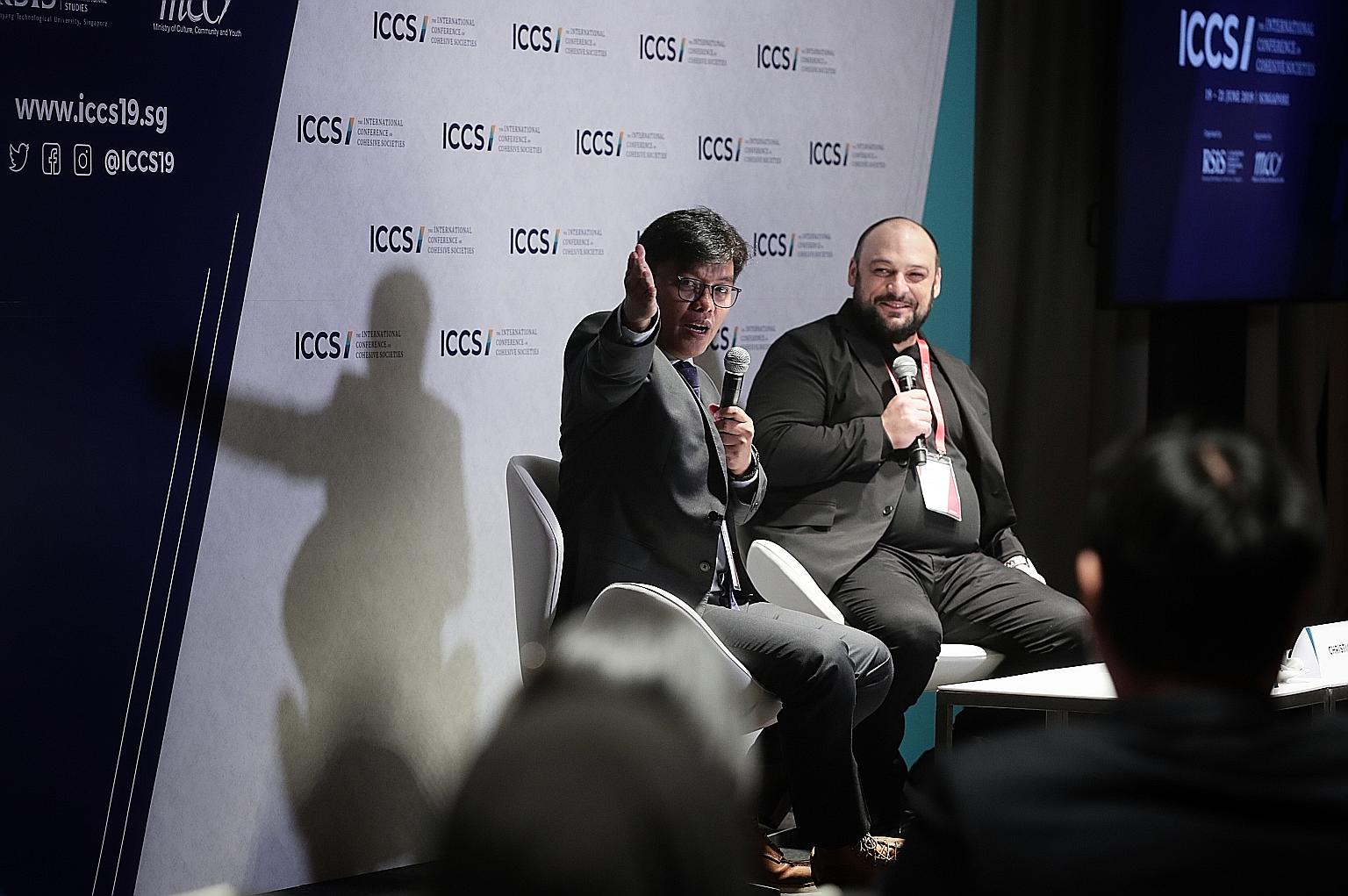International Conference on Cohesive Societies
Ex-white supremacist and anti-terror activist share tales of extremism
Sign up now: Get ST's newsletters delivered to your inbox

Indonesian activist Noor Huda Ismail (far left) and former white supremacist recruiter Christian Picciolini at a session on overcoming hate at the International Conference on Cohesive Societies yesterday.
ST PHOTO: KELVIN CHNG
One is a former American white supremacist recruiter who now helps people disengage from extremist ideologies.
The other is an Indonesian activist who works to rehabilitate radicalised fighters returning home.
But Mr Christian Picciolini and Dr Noor Huda Ismail see common ground in their work, winning first the hearts, and then the minds, of those they try to help. Yesterday, they shared their perspectives with delegates of the International Conference on Cohesive Societies on why individuals join extremist movements, and the need to better understand their motivations.
"Extremism does not stem from ideology. Rather, it is social circumstances that drive individuals towards terrorism," Dr Noor Huda told The Straits Times later.
These circumstances include poverty, conflict, broken families, isolation and not finding meaning in their lives, said the founder of the Institute for International Peace Building in Indonesia, which helps to reintegrate former terrorists into mainstream society by encouraging them to share their stories.
Mr Picciolini, founder of the US non-profit Free Radicals Project, said there are similarities in the way he, and many others, turned to extremism. He cited how a close friend from Belgium had "almost the exact story" he did. This person, who went to Syria, was a first-generation Belgian whose parents were from Morocco. Mr Picciolini's parents were from Italy and had moved to the United States.
"Both of us felt very alienated from our communities," he said. "He came from a good family. He was looking for meaning, he was looking to find purpose, and somebody promised him paradise, just like I used to promise people paradise when I was a recruiter."
Dr Noor Huda noted that technology makes it easier to indoctrinate and recruit the disenfranchised.
"Today, when people cannot find something meaningful in their lives, they go online," he said. "Previously, a person would have to physically be in a conflict zone to connect to those suffering. But now, with social media, the conflict is right in your palm (your phone), and it creates imagined solidarity."
"These people become victims of ISIS lies perpetrated online. They are those who were swayed by ISIS narratives," he added, referring to the Islamic State in Iraq and Syria.
Dr Noor Huda could have gone down the extremist track.
At 12, his parents, both civil servants in Solo, sent him to the hardline Al Mukmin Islamic boarding school founded by Jemaah Islamiah leader Abu Bakar Bashir.
He later became disillusioned by the school's teachings and left.
While working as a stringer for The Washington Post, he learnt that one of the perpetrators of the 2002 Bali bombings which killed 202 people was his former roommate Mubarok.
In 2008, he started his institute and began recruiting former terrorists who were still in prison and wanted to start over. The organisation helps them find jobs and new communities once they are freed.
So far, he has helped 50 people.
"Most of them do not want to return," he said. "When they come to us, they want to restart their lives. But often, society does not give them a second chance."
He believes ground-up collaboration is useful in reaching those with the potential to be radicalised.
Mr Picciolini said: "Nobody is born to hate, nobody is born a terrorist. Even if you are born into a home where your parents are extremists, you still have to learn it.
"And... if we can learn it, we can unlearn it and learn how to love."


